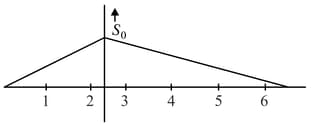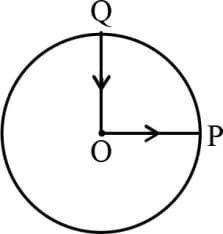Speed and Velocity
Speed and Velocity: Overview
This Topic covers sub-topics such as Average Speed, Average Velocity, Instantaneous Velocity and, Average Velocity when Time Intervals Given
Important Questions on Speed and Velocity
The most probable, root-mean-square speeds and average velocity are in the ratio of _____ respectively (with three decimal places).
The motion of a particle is described by . Find the initial velocity of the particle.
The position of an object moving along axis is given by , where and is measured in seconds. The instantaneous velocity of the object at is
A body moving along a straight line travels one third of the total distance with a speed of . The remaining distance is covered with a speed of for half the time and for the other half of the time. The average speed during the motion is
The position of an object moving along x-axis is given by , Where and and is measured in seconds. The average velocity of the object between and is:
Which of the following statements are incorrect ?
Average velocity is path length divided by time interval.
In general, speed is greater than the magnitude of the velocity.
A particle moving in given direction with a non-zero velocity can have zero speed.
The magnitude of average velocity is the average speed.
What will be ratio of speed in first two seconds to the speed in next 4s?

The average speed of a group of 7 gas molecules having velocity is-
Assertion: Average velocity of a particle moving on curved path is never equal to instantaneous velocity of particle.
Reason: Neither magnitude nor direction of average velocity can be same as that of instantaneous velocity of particle which is moving on curved path.
Assertion: Magnitude of instantaneous velocity is equal to instantaneous speed.
Reason: Distance is nearly equal to displacement if displacement is very small.
Assertion: A body is momentarily at rest when it reverses the direction.
Reason: A body cannot have acceleration if its velocity is zero at a given instant of time.
Assertion: A body can have acceleration even if its velocity is zero at a given instant of time
Reason: A body is momentarily at rest when it reverses its direction of motion
A study of automobile speeds on a highway yielded the following data for a 1 hour period- Speed in and Number of cars (n)
(i) 40 kmph -10 cars
(ii) 45 kmph- 8 cars
(iii) 50 kmph- 15 cars
(iv) 55 kmph- 10 cars
(v) 60 kmph- 12 cars
Which of the following is/are correct-
A cyclist starts from the centre of a circular park of radius one kilometre, reaches the edge of the park, then cycles along the circumference and returns to the centre along as shown in the figure. If the round trip takes ten minute, the net displacement and average speed of the cyclist (in and , respectively) is

A particle is moving in a straight line along axis, its position is given by,, where is in metre and in second, the acceleration of the particle is
A car travels equal distances in the same direction with velocities , and 10 respectively. The average velocity of the car over the whole journey of motion is
A body starts from origin and moves along -axis such that at any instant velocity is where is in second and in . The acceleration of the particle when it is 2m from the origin is
A particle is moving on a straight line path with constant acceleration directed along the direction of instantaneous velocity. Which of the following statements are false about the motion of particle?
A car moves from with a uniform speed and returns to with a uniform speed The average speed for this round trip is
A body of mass moving along a straight line covers half the distance with a speed of The remaining half of distance is covered in two equal time intervals with a speed of respectively. The average speed of the particle for the entire journey is
